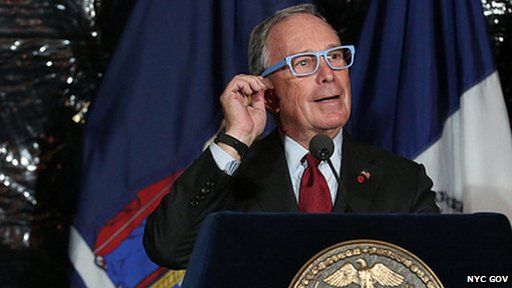The start-ups that favour New York over Silicon Valley
- Published

New York's start-up scene has been booming, with the sector creating more than 10,000 jobs in the city over the past five years. Some talk of Silicon Alley as being a credible rival to its west coast counterpart.
But what quickly emerges when you speak to those involved in New York's start-ups is how they are focused on solving specific everyday problems rather than Silicon Valley's broader game-shifting approach.
Take New Yorker Roger Wu. He knows that we care about the opinions of our friends.
He also believes that we go to different friends for different advice, and that we could benefit from integrating this with social media.
He aims to make this happen with his start-up ShopMine, which analyses Pinterest accounts and helps users know which of their friends to turn to for recommendations on specific products and services.
In 2007 Wu travelled to the San Francisco Bay Area to see if he should base his start-up dreams out there, but soon returned east.
"I think here there's more of a business mind-set," he says, "as opposed to creating technology for the sake of it and then figuring out what market there is."
Silicon Alley's ambitions
Many of New York's tech entrepreneurs strongly believe that the city's diversity of people and industries is one of its key assets for attracting top talent and creating new and successful start-ups.
"In New York there are so many different industries that are the 'it' industry," Wu explains, citing finance, fashion, advertising and media as a few examples.
He says this beats the "tight knit clique" of tech found in Silicon Valley and the San Francisco Bay Area, and means that New York's start-ups are more consumer-focused.
Wu also believes that this means funding is more readily available for a wider range of ventures.
Out of the country's half dozen leading technology cities, New York has been the only one to see an increase in venture capital deals, which have risen by 32% since 2007.
Unique flavours
Down the road in Soho, David Haber works at venture capital firm Spark Capital.
Local companies it's invested in often have a specific focus, such as 1stDibs, an online marketplace for antiques and vintage goods, and the popular glasses e-retailer Warby Parker.
Warby Parker make trendy vintage inspired glasses, selling them complete with prescription lenses for $95 (£59), compared to the $300 (£186) or upwards that's often charged for a pair of spectacles.
The company provides a service where consumers can choose five glasses online to be mailed home for free, before selecting a pair to buy.
Customers can also load their photo onto its website and try on different glasses that way.
Mr Haber says it is typical of New York companies that make the most of technological innovations, but do not allow them to become their focus.
"It's easy in the Valley to get caught in this echo chamber of what's happening within technology," he says.
Needing people to grow
Some of the city's start-uppers come from a variety of non-tech or business backgrounds and apply these experiences to very specific problems.
Jonathan Block spent years in the music industry, managing the bands G Love and the Special Sauce, and the Fun Lovin' Criminals.
He is now turning his attention to disrupting the music merchandise space through his soon to be launched venture TheHub.fm.
"There is one aspect of the music industry that has never changed or been disrupted in a helpful or positive manner," Block explains, "That is, specifically, the sale of merchandise."
TheHub.fm aims to make the sale and supply of music merchandise more efficient.
Block says that the current system often leaves fans in long queues only to be left empty handed once merchandise in their size and colour runs out.
Bands also lose money on these lost sales.
He aims to use mobile technology to make this transaction more efficient for both parties.
Block is focused on a particular problem, but he believes solving it involves speaking to a wide range of potential clients - and New York's melting pot offers the perfect opportunity to hone his ideas.
"If you want to grow in business you need to continuously be meeting new people," he says.
California dreamin'
However, New York's focus on targeting specific problems doesn't suit everyone.
San Francisco Bay Area native Michael Molesky spent a year and a half in New York developing his venture Marker, before moving back home.
The online service aims to allow individuals to share places which they love with their friends and followers.
While he was based in New York he travelled back home frequently and had conversations with people in both locations about his project.
"People in San Francisco really saw the vision more," he says.
"New Yorkers tend to be a lot more competitive whereas people in Silicon Valley, I think of them as more ambitious."
He is sceptical that New York's tightly focused start-ups can have a deep influence in society.
Instead, he says, paradigm shifts require Silicon Valley's mentality of "thinking big thoughts and attacking big problems", and people who are "dreamers".
"The companies that have really shifted the way we think about technology and media have consistently been based out here in California," he adds.
- Published6 December 2012
- Published26 September 2012
- Published20 July 2012